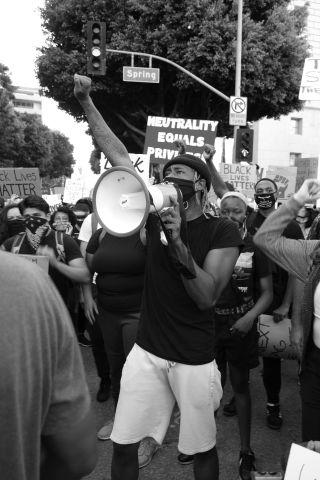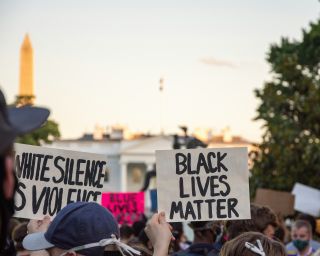Race and Ethnicity
How Parents Talked With Their Children About BLM
Study reports that promoting race conversations is necessary but not sufficient.
Updated February 2, 2024 Reviewed by Tyler Woods
Key points
- 84% of Black parents and 76% of white parents reported talking about Black Lives Matter with their children.
- Most Black parents acknowledged racial inequality, affirmed the value of Black lives, and called for justice.
- Fewer white parents acknowledged inequality. Some focused on general equality, and 27% lacked substance.
In the summer of 2020, it seemed like the U.S. was finally ready to talk about race and the enduring legacy of racism in our social systems. Racial justice rallies, protests, and vigils were held across the nation, social media platforms swarmed with online activism, and major cities painted their streets to declare that “Black Lives Matter.” Even Elmo was talking about race in CNN’s Town Hall with Sesame Street. Support for "Black Lives Matter" hit its peak that summer, with 67 percent of Americans reporting their agreement with the movement. It seemed like America was finally breaking the racial silence.

As social scientists studying children’s racial development, we were curious about what, if anything, parents were doing with this deluge of information. Various experts were telling parents that not talking about race was not good and that they needed to talk with their children about race. But were parents doing it? And if so, what were they saying?
In late fall of 2020, our team launched On Parenting About Race, an online study with Black and white parents of children ages 8 to 11 years old, to ask about their parenting during COVID and about their race-related conversations. We were especially interested in whether parents were talking with their children about the Black Lives Matter movement that had so profoundly marked the summer of 2020 and fundamentally shifted the public racial discourse.
Our new study, released online in advance of publication by Developmental Psychology, showed that 80 percent of the 725 parents who completed our survey reported talking with their children about BLM. This was true for 84 percent of Black parents and 76 percent of white parents. This seemed like good news for the op-eds and news specials that had called on parents to talk about race, especially white parents who have historically avoided race-related topics or downplayed race-related events.
But we also asked parents: “What did you say to your child about Black Lives Matter?” These data paint a far more nuanced picture, especially among white parents.
Across the sample, about one-third of parents communicated a message about BLM that "acknowledged inequality": naming racism explicitly or acknowledging racial injustice in society. But the main story in our data is racially divided: white and Black parents communicated very different messages about BLM.

Although 76 percent of white parents said they talked about Black Lives Matter with their children, more than a quarter (27 percent) gave responses that were either nonsensical or simply copied and pasted definitions and article excerpts from internet sources (most commonly Wikipedia). It is worth noting that 14 percent of white parents copy/pasted their responses to this question compared to just only 1 percent of Black parents. Certainly, this raises the question of whether these parents actually had such conversations, but also suggests that white parents were aware that they were “supposed to” talk about race and thus claimed they did so, but, when prompted, lacked the substance to back it up.
But there is some good news.
Of the white parents who gave substantive responses about their BLM conversations, about 23 percent acknowledged racial inequality or injustice in some form with their child:
“I talk with my son about how wrongful deaths of men and women of color at the hands of police." (White father, 41 years old).
Another 20 percent emphasized colorblind or general equality messages, which skim the surface of race conversations but avoid the specificities of the injustice or inequality that exists and verge toward missing the crux of BLM. For example:
"That all lives matter no matter your skin color” (White mother, 33 years old).
The story for Black parents is notably different—and a promising model for the kinds of race conversations that are possible among parents with elementary-aged children. Black parents communicated various messages, but there was a cohesive thread among them: 78 percent of Black parents who talked with their children about BLM spoke about racial inequality and injustice and the need to affirm and uplift the value of Black lives.
“I try to remind him that he is important and worthy despite what the media tells us.” (Black mother, 28 years old).
This is a markedly different narrative from what we heard from white parents, and a pattern follows decades of research showing that Black families and other families of color have race-related conversations frequently. Why? Because it’s necessary. Raising Black children in the U.S., where negative racial stereotypes and structural inequalities persist, requires instilling positive self-affirmations, knowledge of one’s history, and careful preparation for racial bias and discrimination. Talking about race for many Black parents is personal and political.
“I told him people are protesting to help make sure that Black lives are treated fairly and that we get equal rights with others. That it’s important to always fight for what’s right.” (Black mother, 35 years)
While race and racism conversations may not seem personally relevant for white families, they are equally necessary and urgent. Indeed, in a society that is organized by racism, where beliefs about the superiority of white people and inferiority of Black people are engrained in our laws, justice systems, educational policies, housing, healthcare practices, and everyday conversations, doing nothing—saying nothing—is not a null effect. In fact, it reinforces the status quo.
“Silence is violence” is the rallying cry carried in protests across decades of racial justice marches. Because the structures of racism are so deeply entrenched in our society—and in ourselves—it's easy, almost natural, for children to grow up seeing and believing racism is normal. Talking about race with your child is a tool to disrupt the fallacy of racial equality.

Promoting more race conversations among families is necessary but not sufficient. Yes, we should continue to encourage parents to talk about race. But more importantly, we should encourage parents to acknowledge racism and name the persistent harm of racial injustice. We should urge them to be accountable for the equitable, just, and humane future that we hope for. The Black parents in our study modeled how to talk with young children about race and racism in ways that disrupt racism and provide the context for why the collective work of equity is important.
“It is important you understand that some people do not believe that Black loss [lives] have merit. We need to educate them to show them that Black lives do in fact matter.” (Black father, 47 years)
Rev. Dr. Martin Luther King Jr. famously said, "The arc of the moral universe is long, but it bends toward justice.” Perhaps. But why passively wait for the moral arc to bend itself when we can collectively work to bend it?
References
Rogers, L. O., Scott, K. E., Wintz, F., Eisenman, S. R., Dorsi, C., Chae, D., & Meltzoff, A. N. (2024). Exploring whether and how Black and White parents talk with their children about race: M(ai)cro race conversations about Black Lives Matter. Developmental Psychology. Advance online publication. https://doi.org/10.1037/dev0001693




